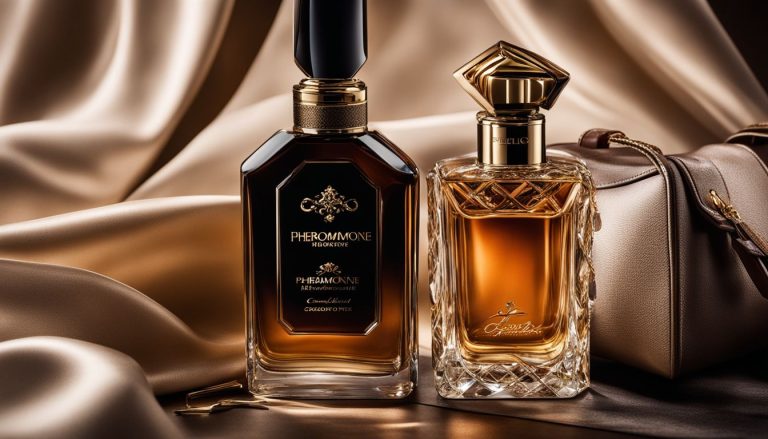The Science Behind Do Pheromone Fragrances Work: Exploring the Evidence
Have you ever wondered if a spray could make you irresistible? Pheromone fragrances promise to boost your appeal by using natural chemical signals. In this article, we’ll dive into what science says about these scents and if they really influence attraction.
Keep reading; the truth may surprise you!
Key Takeaways
- Pheromone fragrances contain synthetic compounds meant to mimic natural chemicals that communicate information between members of the same species, including potential mating partners.
- The effectiveness of pheromone perfumes in influencing human attraction and behavior is highly controversial with no definitive scientific consensus; some studies suggest they may impact mood and perception of others, while others show little or no effect.
- Personal experiences with pheromone products vary greatly, indicating that personal chemistry and genetic makeup play significant roles in how individuals respond to these scents.
- Despite varied claims by manufacturers, ongoing research has yet to provide solid evidence for the role of pheromones in human sexual attraction or social interaction.
- While selecting a pheromone fragrance, it’s recommended to consider your own body odor and experiment with different brands and scents to find one that complements your natural chemistry.
What Are Pheromones?
Pheromones are chemical signals that animals and humans release to communicate with others of the same species. They play a role in sexual attraction, territorial marking, and social bonding.
Definition and function
Pheromones are chemical signals released by an organism that trigger social responses in members of the same species. These invisible scents can influence behaviors and emotions, like mating rituals or marking territory.
In humans, the role of pheromones is less clear, but some evidence suggests they may communicate information about a person’s mood, sexual orientation, and genetic compatibility to potential partners.
They function primarily through olfaction, where the scent molecules interact with receptors in the nose triggering a subconscious response in the brain. This process can play a part in pheromone attraction as it subtly informs individuals about others nearby.
However, despite ongoing research on natural pheromones and their synthetic counterparts used in products like pheromone colognes or perfumes, definitive conclusions on their effectiveness remain elusive due to mixed results from various studies.
Types of pheromones
Human pheromones are categorized into several types, including releaser pheromones, which trigger an immediate response.
Differences between animals and humans
Pheromones play a crucial role in animal communication, influencing mating behavior and social interactions. In animals, these chemical signals are involved in marking territories, signaling danger, and facilitating reproduction.
Unlike animals, the existence and function of pheromones in humans remain a topic of debate among researchers. While some studies suggest that certain scents may influence human behavior and emotions, there is still no conclusive evidence supporting the presence of specific pheromones designed for sexual attraction or other behaviors as observed in animals.
The differences between animals and humans regarding pheromone perception highlight the complexity of understanding how scent-based chemicals impact human behavior. While animals rely heavily on pheromones to communicate with one another, human responses to supposed pheromonal cues remain uncertain.
The Science Behind Pheromone Fragrances
Pheromone fragrances contain chemical compounds that mimic natural pheromones, which can influence sexual attraction and communication. Understanding how these fragrances work in the body sheds light on their potential impact on human behavior.
What is in pheromone products?
Pheromone products usually contain a combination of synthetic compounds that mimic natural pheromones. These compounds can include androstenone, androsterone, and copulin, which are believed to play a role in signaling attraction or eliciting specific responses in humans.
Researchers are still exploring the effects of these compounds on human behavior and whether they genuinely replicate the functions of natural pheromones found in animals.
While there is ongoing debate about the effectiveness of pheromone perfumes, some studies suggest that these compounds may have an impact on mood, sexual orientation, and genetic cues.
How pheromones work in the body
Moving from the ingredients of pheromone products to their impact on the body, it’s important to understand how these fragrances work. Pheromones are chemical signals that trigger responses in others who inhale them.
When a person applies pheromone-based fragrances, the compounds interact with receptors in the nasal cavity, sending signals to the brain. Some researchers believe that these signals can influence mood and emotions; however, there is still ongoing debate around this theory.
Studies have suggested that certain pheromones might play a role in sexual attraction by signaling genetic compatibility between individuals. While some evidence supports this claim, there remains ambiguity about whether these chemicals truly have an effect on human behavior.
Influence on sexual attraction
Pheromone fragrances may have an impact on sexual attraction in humans, but the evidence is inconclusive. Some studies suggest that pheromones can send signals about genetic makeup and sexual orientation, potentially influencing attraction.
However, conflicting research leaves uncertainty about whether pheromone perfumes truly enhance sex appeal. Despite ongoing scientific exploration, there remains no solid proof of their effectiveness in this realm.
The science behind pheromones and sexual attraction continues to be a topic of much debate and study. While conflicting evidence raises doubts, ongoing research seeks to unravel the influence of these fragrances on human behavior and relationships.
The Controversy Surrounding Pheromone Perfumes
There are claims and criticisms surrounding the effectiveness of pheromone perfumes, but research and evidence provide insights into their impact. Read on to explore the controversy surrounding pheromone fragrances and the evidence behind their effectiveness.
Claims and criticisms
Pheromone perfumes have faced claims and criticisms regarding their effectiveness. Some studies have suggested that these fragrances may not deliver the promised benefits, as there is conflicting evidence on their ability to generate sex appeal. Furthermore, researchers are still unsure about how pheromones work in the human body, despite recent discoveries providing some clarity.
- The effectiveness of pheromone perfumes in humans remains unclear, with no solid evidence proving their existence.
- Some critics have accused a perfume company of misleading scientists into believing in the effectiveness of pheromone perfumes.
- There are different opinions on whether pheromone perfumes work on females, adding to the controversy surrounding their efficacy.
- Researchers are actively studying the science behind pheromone attraction but have not reached a definitive conclusion yet.
- Despite claims made by manufacturers, several studies have shown mixed results regarding the impact of pheromone-based fragrances on human behavior.
Research and evidence
Research into the effectiveness of pheromone fragrances in humans has yielded conflicting results. While some studies suggest that pheromones can convey information about moods, sexual orientation, and genetic makeup, there is no solid evidence supporting the existence of human pheromones.
Some researchers are skeptical about whether these fragrances truly impact sexual attraction or behavior. Moreover, one perfume company has faced allegations of misleading scientists about the efficacy of their pheromone perfumes.
Despite ongoing research into the science behind pheromone attraction, uncertainties persist regarding their actual impact on human behavior.
As scientists continue to explore the field of pheromone fragrances, conflicting evidence raises questions about their true effectiveness in influencing human behavior and attraction.
The complexity of this topic becomes apparent as recent discoveries provide insight into how these substances may influence certain aspects of communication and social interaction.
Personal experiences
Individuals’ personal experiences with pheromone fragrances vary widely. Some report feeling more confident and noticing increased attention from others when using these products. However, others claim to have noticed little to no change in their interactions with people while wearing pheromone-based perfumes.
These conflicting personal experiences reflect the ongoing debate about the effectiveness of these fragrances and highlight the need for further research into their impact on human behavior.
One person’s positive encounter with a pheromone fragrance does not necessarily indicate its universal appeal or effectiveness, especially considering the lack of concrete evidence supporting these products’ ability to generate attraction or influence mood.
Tips for Using Pheromone Perfumes
– How to apply pheromone perfumes effectively and maximize their potential
– Recommended brands and scents for different preferences and situations.
How to apply effectively
To apply pheromone fragrances effectively, start by choosing a scent that complements your natural body odor. Apply the fragrance to pulse points such as the wrists, neck, and behind the ears to enhance its impact.
It’s important to understand that personal chemistry plays a significant role in how pheromones interact with others, so finding the right balance is crucial. Experiment with different brands and scents to determine which works best for you based on your own experiences and feedback from others.
Ensure no sentences begin with the same two words.
Do not use any three-word phrases more than once.
Recommended brands and scents
Popular brands such as Raw Chemistry, True Pheromones, and Pherazone offer a range of pheromone perfumes that claim to enhance attraction and confidence. Scents like vanilla, jasmine, and sandalwood are often incorporated into these fragrances to create a pleasing aroma.
However, it’s important to note that individual body chemistry plays a significant role in the effectiveness of these scents. Some people may experience varying results based on their skin type and natural odor, so it’s essential to experiment with different brands and scents to find what works best for each person.
These brands have gained attention for their innovative approach in formulating pheromone-based fragrances by including ingredients like androstenone or copulins that mimic human pheromones.
While some users report positive experiences with increased social interactions and attraction while using these products, others remain skeptical due to limited scientific evidence supporting their claims.
Importance of personal chemistry
Personal chemistry plays a crucial role in how individuals respond to pheromone fragrances. Research suggests that personal body odor and genetic makeup can influence the perception and impact of pheromones on others.
While some people may find certain scents appealing, others may not experience the same attraction due to their unique genetic composition. This emphasizes the significance of personal chemistry in determining the effectiveness of pheromone-based fragrances.
Understanding the importance of personal chemistry can aid individuals in choosing suitable pheromone perfumes that complement their natural scent and genetic predispositions. By considering one’s own body odor and genetic traits, individuals can select pheromone products that align with their unique personal chemistry, potentially enhancing the desired effects on others.
Conclusion
In conclusion, the science behind pheromone fragrances remains unclear and controversial. Studies have shown conflicting evidence on their effectiveness in human attraction. Despite ongoing research into their impact, there is still much uncertainty about how pheromone perfumes work and whether they truly influence behavior.
The debate around pheromone fragrances continues as researchers strive to understand their true effects on human psychology and biology.
FAQs
1. What are pheromones and how do they work in fragrances?
Pheromones are chemical signals that animals use for communication, and when added to fragrances, they’re supposed to boost attraction by sending out these signals.
2. Is there evidence that pheromone fragrances really attract others?
Some research on pheromone fragrances suggests a possible impact on attraction, but the effectiveness varies and more studies are needed to confirm these claims.
3. How does the chemistry of pheromones affect human behavior?
The science of pheromone chemistry explores how these chemicals may influence our behavior subtly through scent signals we might not even notice.
4. Can wearing a pheromone fragrance change people’s perception of you?
Wearing a pheromone fragrance might alter people’s perception due to psychology, biology, and evolutionary biology factors linked to scent appeal and communication.
5. Are all claims about the benefits of pheromone fragrances true?
While some believe in the benefits related to enhanced appeal or improved social interaction, it’s important to look at scientific evidence before accepting all claims about pheromone effects.









